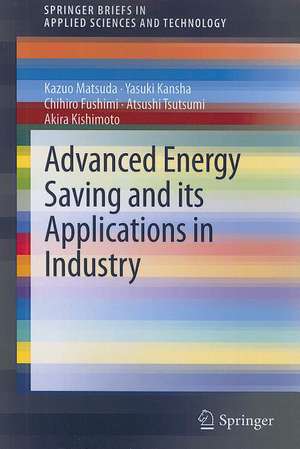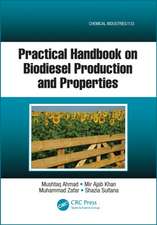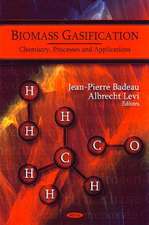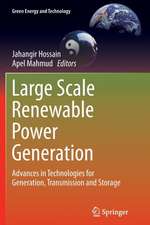Advanced Energy Saving and its Applications in Industry: SpringerBriefs in Applied Sciences and Technology
Autor Kazuo Matsuda, Yasuki Kansha, Chihiro Fushimi, Atsushi Tsutsumi, Akira Kishimotoen Limba Engleză Paperback – 20 iul 2012
Conventional energy saving items in a utility system are applied and implemented based on a single site approach, however, when looking at heavy chemical complexes, it was apparent that the low-grade heat discharged as waste from a refinery could also be used in an adjacent petrochemical plant. There could therefore be a large energy saving potential by utilizing the surplus heat across the sites. Advanced Energy Saving and its Applications in Industry assesses conventional approaches to industrial energy saving and explains and outlines new methods to provide even greater energy saving potential.
Advanced Energy Saving and its Applications in Industry provides a key resource and research tool for all those involved in developing the energy efficiency of industrial processes. Researchers, industry professionals and even students with an interest in green engineering will find the summaries of the conventional and suggested new methods useful when attempting to advance further development within this field.
Din seria SpringerBriefs in Applied Sciences and Technology
-
 Preț: 380.29 lei
Preț: 380.29 lei - 17%
 Preț: 360.33 lei
Preț: 360.33 lei - 20%
 Preț: 386.11 lei
Preț: 386.11 lei -
 Preț: 380.07 lei
Preț: 380.07 lei -
 Preț: 377.95 lei
Preț: 377.95 lei -
 Preț: 382.32 lei
Preț: 382.32 lei -
 Preț: 376.59 lei
Preț: 376.59 lei -
 Preț: 379.09 lei
Preț: 379.09 lei -
 Preț: 378.12 lei
Preț: 378.12 lei - 20%
 Preț: 293.83 lei
Preț: 293.83 lei -
 Preț: 344.90 lei
Preț: 344.90 lei -
 Preț: 321.35 lei
Preț: 321.35 lei -
 Preț: 264.79 lei
Preț: 264.79 lei -
 Preț: 344.90 lei
Preț: 344.90 lei -
 Preț: 356.45 lei
Preț: 356.45 lei -
 Preț: 382.95 lei
Preț: 382.95 lei -
 Preț: 355.65 lei
Preț: 355.65 lei -
 Preț: 479.67 lei
Preț: 479.67 lei -
 Preț: 415.18 lei
Preț: 415.18 lei -
 Preț: 444.52 lei
Preț: 444.52 lei - 20%
 Preț: 301.85 lei
Preț: 301.85 lei -
 Preț: 409.43 lei
Preț: 409.43 lei - 20%
 Preț: 322.17 lei
Preț: 322.17 lei -
 Preț: 355.48 lei
Preț: 355.48 lei - 15%
 Preț: 462.51 lei
Preț: 462.51 lei -
 Preț: 377.18 lei
Preț: 377.18 lei -
 Preț: 355.92 lei
Preț: 355.92 lei -
 Preț: 382.95 lei
Preț: 382.95 lei -
 Preț: 378.12 lei
Preț: 378.12 lei -
 Preț: 378.12 lei
Preț: 378.12 lei -
 Preț: 380.07 lei
Preț: 380.07 lei -
 Preț: 380.07 lei
Preț: 380.07 lei - 20%
 Preț: 326.28 lei
Preț: 326.28 lei -
 Preț: 312.68 lei
Preț: 312.68 lei -
 Preț: 356.42 lei
Preț: 356.42 lei -
 Preț: 412.30 lei
Preț: 412.30 lei - 20%
 Preț: 225.31 lei
Preț: 225.31 lei -
 Preț: 378.12 lei
Preț: 378.12 lei -
 Preț: 376.59 lei
Preț: 376.59 lei -
 Preț: 195.87 lei
Preț: 195.87 lei -
 Preț: 376.22 lei
Preț: 376.22 lei - 20%
 Preț: 324.64 lei
Preț: 324.64 lei - 20%
 Preț: 288.73 lei
Preț: 288.73 lei -
 Preț: 377.57 lei
Preț: 377.57 lei -
 Preț: 261.91 lei
Preț: 261.91 lei -
 Preț: 381.98 lei
Preț: 381.98 lei -
 Preț: 273.63 lei
Preț: 273.63 lei -
 Preț: 410.85 lei
Preț: 410.85 lei -
 Preț: 379.68 lei
Preț: 379.68 lei -
 Preț: 374.30 lei
Preț: 374.30 lei
Preț: 347.31 lei
Nou
Puncte Express: 521
Preț estimativ în valută:
66.46€ • 69.56$ • 55.31£
66.46€ • 69.56$ • 55.31£
Carte tipărită la comandă
Livrare economică 26 martie-01 aprilie
Preluare comenzi: 021 569.72.76
Specificații
ISBN-13: 9781447142065
ISBN-10: 1447142063
Pagini: 88
Ilustrații: XI, 75 p. 35 illus.
Dimensiuni: 155 x 235 x 17 mm
Greutate: 0.14 kg
Ediția:2013
Editura: SPRINGER LONDON
Colecția Springer
Seria SpringerBriefs in Applied Sciences and Technology
Locul publicării:London, United Kingdom
ISBN-10: 1447142063
Pagini: 88
Ilustrații: XI, 75 p. 35 illus.
Dimensiuni: 155 x 235 x 17 mm
Greutate: 0.14 kg
Ediția:2013
Editura: SPRINGER LONDON
Colecția Springer
Seria SpringerBriefs in Applied Sciences and Technology
Locul publicării:London, United Kingdom
Public țintă
ResearchCuprins
Part I Process System.- 1. Energy saving technology.- Part II Application of Self-heat Recuperation Technology.- 2. Reaction section.- 3. Distillation section.- 4. Drying section.- 5. Gas separation section.- Part III Utility system.- 6. Utility system.
Notă biografică
Kazuo Matsuda has been assigned as the General Manager of Sustainable Business Development Section, Chiyoda Corporation, Japan. He has been responsible for R&D of innovative energy conservation technology with government fund to develop the self-heat recuperation and also a vast number of energy conservation studies at heavy chemical complexes for long years. Through such studies, he was able to establish way of diagnosis of energy conservation, engineering of energy conservation, verification of energy conservation for plant. He is an international scientific committee member of PRES (Process Integration, Modelling and Optimisation for Energy Saving and Pollution Reduction). He received B.Sc. in Petrochemical Engineering, Kyoto University, 1977.
Yasuki Kansha is Project Research Associate at Institute of Industrial Science, The University of Tokyo, where he is researching process design methodology for energy saving based on self-heat recuperation. His research activities are focused on process system engineering and thermodynamics, i.e. process design and control, optimization, heat integration, and energy/exergy analysis in chemical processes. He received a Bachelor degree from Kyoto University, Japan in 2002 and a PhD from National University of Singapore in 2008, specialized in Chemical Engineering.
Chihiro Fushimi received his Bachelor, Master and PhD degrees from The University of Tokyo, Japan in 1999, 2001 and 2004, respectively, all specialized in Chemical Engineering. After obtained PhD, he worked in University of Hawaii at Manoa (Honolulu, USA) as a visiting scholar for one year and Research Institute of Innovative Technology for the Earth (RITE, Kyoto, Japan) as a researcher for two years. Then, he started working at Institute of Industrial Science, The University of Tokyo as Research Associate since April 2007 and moved to Department of Chemical Engineering, Tokyo University of Agriculture and Technology as Associate Professor in October 2011. His research interests are clean-coal technology, efficient utilization of biomass for sustainable society, pyrolysis/gasification technology, fluidized bed, drying technology and energy conservation technology.
Akira Kishimoto is Postdoctoral Researcher in The University of Tokyo. He is a mechanical engineer and received a PhD in mechanical engineering from The University of Tokyo in May 2012. He has been developing energy saving processes for a decade in JFE engineering Co., and The University of Tokyo. He has developed the heating and air conditioning units using phase change material in JFE engineering Co. His research theme is energy saving for gas separation processes, which are CO2 capture and air separation processes.
Atsushi Tsutsumi is Professor of Institute of Industrial Science at The University of Tokyo, Japan. He received his Doctorate of Engineering from The University of Tokyo in 1986. He has been active in research on material and energy coproduction based on exergy recuperation technology, exergy recuperative advanced IGCC/IGFC, innovative energy conservation by self-heat recuperation, fuel cell/battery (FCB) with energy sparkling and hydrogen production by biomass gasification for the last ten years. He has published over 158 scientific publications, 266 proceedings in international journals and conferences and 20 books.
Yasuki Kansha is Project Research Associate at Institute of Industrial Science, The University of Tokyo, where he is researching process design methodology for energy saving based on self-heat recuperation. His research activities are focused on process system engineering and thermodynamics, i.e. process design and control, optimization, heat integration, and energy/exergy analysis in chemical processes. He received a Bachelor degree from Kyoto University, Japan in 2002 and a PhD from National University of Singapore in 2008, specialized in Chemical Engineering.
Chihiro Fushimi received his Bachelor, Master and PhD degrees from The University of Tokyo, Japan in 1999, 2001 and 2004, respectively, all specialized in Chemical Engineering. After obtained PhD, he worked in University of Hawaii at Manoa (Honolulu, USA) as a visiting scholar for one year and Research Institute of Innovative Technology for the Earth (RITE, Kyoto, Japan) as a researcher for two years. Then, he started working at Institute of Industrial Science, The University of Tokyo as Research Associate since April 2007 and moved to Department of Chemical Engineering, Tokyo University of Agriculture and Technology as Associate Professor in October 2011. His research interests are clean-coal technology, efficient utilization of biomass for sustainable society, pyrolysis/gasification technology, fluidized bed, drying technology and energy conservation technology.
Akira Kishimoto is Postdoctoral Researcher in The University of Tokyo. He is a mechanical engineer and received a PhD in mechanical engineering from The University of Tokyo in May 2012. He has been developing energy saving processes for a decade in JFE engineering Co., and The University of Tokyo. He has developed the heating and air conditioning units using phase change material in JFE engineering Co. His research theme is energy saving for gas separation processes, which are CO2 capture and air separation processes.
Atsushi Tsutsumi is Professor of Institute of Industrial Science at The University of Tokyo, Japan. He received his Doctorate of Engineering from The University of Tokyo in 1986. He has been active in research on material and energy coproduction based on exergy recuperation technology, exergy recuperative advanced IGCC/IGFC, innovative energy conservation by self-heat recuperation, fuel cell/battery (FCB) with energy sparkling and hydrogen production by biomass gasification for the last ten years. He has published over 158 scientific publications, 266 proceedings in international journals and conferences and 20 books.
Caracteristici
Provides readers with an understanding of and assistance with conventional energy saving methods in industry Introduces new approached with large energy saving potential Explains new practical approaches comprehensively, from the theory to application Includes supplementary material: sn.pub/extras























